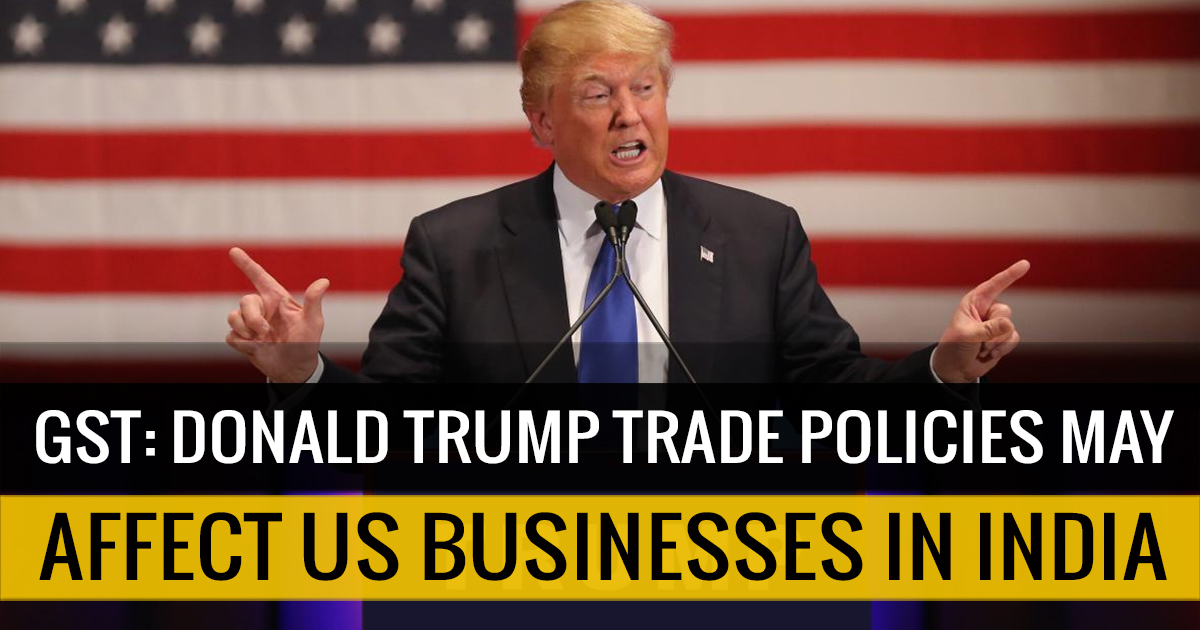India has a long way to go for the proper implementation of the GST and its positive finding because in the world of uncertainty no one can define the change for certain, as the world sits tight for Donald Trump to move as the 45th president of the US, there’s incredible consideration on the progressions his administration is probably going to introduce in the US exchange policies. A portion of the progressions may affect India and can stretch out to the possibilities of India’s impending Goods and Services tax (GST). A large portion of these progressions will have a broad effect on the possibilities of respective exchange between different nations and the US as Trump needs US businesses to create from home as opposed to from abroad.
Indeed, automakers and different US makers at present manufacturing abroad and exporting to the US are probably going to face high customs duties on their fares if the Trump administration is not kidding in implementing the danger and he has particularly focused on car producers in such manner. Trump might want US automakers like Ford and General Motors to gather vehicles in the US, instead of from offices in Mexico or other remote nations and fire them to the US, as they regularly do now. He has additionally encouraged German and Japanese automakers, for example, BMW, Mercedes-Benz, and Toyota to do moreover.
He may likewise force a tax on the US organizations that outsource administrations. Every one of these policies is a piece of his arrangements to secure existing American occupations and make new ones. This was one of the central topics of his discretionary battle. Trump additionally plans to decrease corporate income taxes for making manufacturing from the US a more alluring alternative for American and worldwide businesses. American laborers who lost their employments from the movement of US businesses to Mexico and different parts of the world have bolstered Trump wholeheartedly and now for Trump, it is currently ‘payback time’.
The new fiscal policies can antagonistically affect the investment of US organizations in the Make-in-India initiative. A few prominent US organizations are as of now producing or have plans for producing from India. High customs duties on fares to the US and lower corporate income taxes will make disincentives for American organizations that are manufacturing abroad. Apple is required to begin assembling iPhones in India from not long from now and also significant airplane makers like Lockheed Martin and Boeing have likewise dedicated to investing in India. These include American organizations producing from India.
Read Also: Goods and Services Tax (GST) Impact on Businesses in India
American organizations from India that are probably going to face high customs duties on their fares to the US would be concerned over retaining their cost favorable circumstances. This may lead them to campaign with the Indian government for concessions. The in all probability concessions they would demand are installment from indirect taxes. Ford has a few manufacturing offices in India from where it collects and fares vehicles. Trump’s policies can make India a less alluring area for every one of these organizations. It can make India comparably less appealing in the inventory network dreams of other remote investors that administration the US showcase as a destination for their final items from India. Exporters are additionally not required to pay customs duties on import of a few capital products and basic inputs for fares under different incentive plans of the legislature of India.
The introduction of the GST in India will change the situation. The GST will supplant numerous indirect taxes like the central excise, sales tax, VAT and administration tax by a single solidified tax. The solidification will bring to an end the exclusions connected with different taxes for exporters. Starting at now, it gives the idea that exporters will first need to pay the GST on every single crude material, inputs and different administrations they source locally for their fares and later claim discounts. Exporters from India are at present exempted from paying a few indirect taxes. These include the value added tax (VAT), sales tax and central excise. The Duty Drawback office permits exporters to claim discounts on central excise and customs duties paid on crude materials and different inputs utilized as a part of fares.
Read Also: GST vs VAT: Simple Way to Describe the Differences
This would infer more prominent uses for exporters since discounts will emerge simply following a while. For US organizations exporting back to the US, this may mean incurring more costs, both in producing in India and in addition to exporting to the US through higher customs duties. The approach of the GST combined with Trump’s monetary policies for discouraging imports may affect cost intensity of US businesses in India, forcing them to campaign hard to seek exclusions from a forthright installment of GST. Apple’s demands for tax concessions, for instance, which are currently with the exception of customs duties on imported segments required for assembling iPhone, may expand to include forthright exclusion from GST.
This would increase the intricacies and difficulties of administering the GST in India since the GST is probably going to be executed on a non-exception principle. Donald Trump and his exchange policies were certainly not among the “stuns” that the GST organizers had represented while preparations. While India is ready to see all the changes which the GST will bring upon even if it’s hard or easy to consume.
